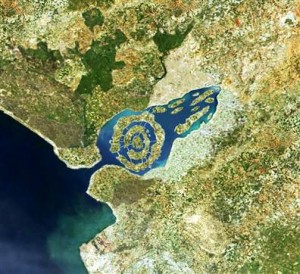 A chance encounter, a sloshy woman at a corner bar, a recollection of an uncle who fell into a well, all the tequila poured, all the prejudices spun out, about my accent and my allegedly highborn ways, about the elections and conspiratorial meanderings, my filters built into a Great Wall against a bareknuckle dustup, bloodied noses and cops and lights, and then, as the night drew up into its cold intestines, a mention just in passing that this uncle fell in the well on the solstice morning and became some kind of sloganeer, some kind of soothsayer. But it was more, I heard her faintly say, and that the shocks of that icy water aroused some otherworldly spirit within him, around 1958 or so, and he was cast out of his church and lost his business, an upwardly-mobile fin-tailed car magnate with a country-club future. He wandered the countryside with his well-sprung tale until impoverished and abandoned by his wife and two adorable children, her cousins, one who was now dead (the boy), crushed by a front-end loader at a construction pit, and the other who was a retired school librarian down in Fayetteville. That cousin had kept all his writings, all about the physics of Tlon.
A chance encounter, a sloshy woman at a corner bar, a recollection of an uncle who fell into a well, all the tequila poured, all the prejudices spun out, about my accent and my allegedly highborn ways, about the elections and conspiratorial meanderings, my filters built into a Great Wall against a bareknuckle dustup, bloodied noses and cops and lights, and then, as the night drew up into its cold intestines, a mention just in passing that this uncle fell in the well on the solstice morning and became some kind of sloganeer, some kind of soothsayer. But it was more, I heard her faintly say, and that the shocks of that icy water aroused some otherworldly spirit within him, around 1958 or so, and he was cast out of his church and lost his business, an upwardly-mobile fin-tailed car magnate with a country-club future. He wandered the countryside with his well-sprung tale until impoverished and abandoned by his wife and two adorable children, her cousins, one who was now dead (the boy), crushed by a front-end loader at a construction pit, and the other who was a retired school librarian down in Fayetteville. That cousin had kept all his writings, all about the physics of Tlon.
My ears perked up and I asked her again what she had uttered, about the slurred syllables that came forth from her salted and limed lips. She repeated the word again, then laughed at me, hissed “Tlon” once more and shuttled her head side-to-side. It was another world her demented uncle had bragged about, some agitated dream erupting from his freezing parts while captive in that black bore. It was a solstice night, long, with the snows of the preceding week in skirts around the trees.… Read the rest
